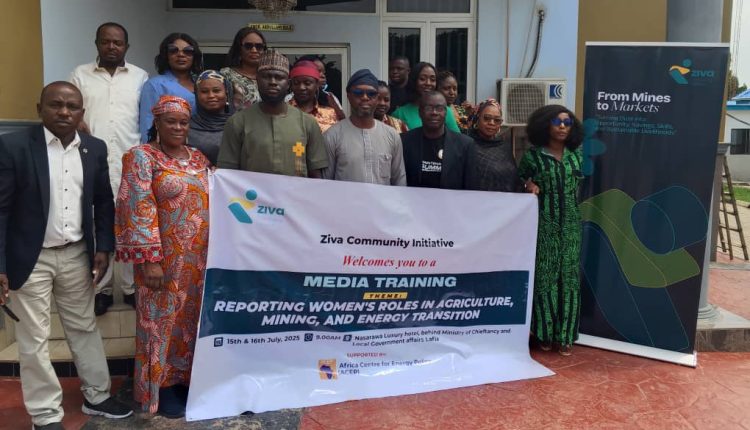NGO urges women in mining, agriculture to leverage cooperative for sustainability
|
Getting your Trinity Audio player ready...
|
By Oboh Linus, Lafia
Ziva Community Initiative, a Non-Governmental Organisation (NGO), has urged women in mining and agriculture to form a cooperative society to enable them to access grants and soft loans to increase their productivity.
Mr Samuel Pam, Programme Lead, Ziva Community Initiative gave this advice at the two-day media training on Reporting Women’s Involvement in Sustainable Agriculture, Lithium Mining and Energy Transition in Lafia.
According to Pam, the chance of women in mining and agriculture being heard by policymakers is increased when they come together as a registered entity.
“Before now they called them illegal miners but with advocacy from different organisations, which Ziva Community Initiative is part of, the narrative has changed, they are now called artisanal small-scale miners.
“We have been able to identify these women within different communities bringing them together to form a cooperative, and this serves as a platform they can use to access different grants, agitate or lobby for inclusive policies.
“We facilitated several such opportunities where we trained them and linked them up to different micro credit entities, they were able to get soft loans and grants that helped them acquire most of their mining and farming tools,” he explained.
The Programme Lead said the media training aimed at strengthening Journalists’ capacity to use their space and influence in amplifying the voices of women in mining and agriculture as well as the need to transition to clean energy.
“We cannot do this alone, we need Journalists as partners and critical stakeholders to tell their stories, amplify their voices so that we can have more ripple effects of women coming in to thrive in these sectors.
“Because we come to understand that women are pillars of the society and family, that is why we are building their capacity to do it in a more sustainable and responsible way that does not damage the environment,” he said.
Ms Patience Ogbode, Project Lead for Increasing Renewable Energy Investment for the Empowerment of Women Sustainable Agriculture and Lithium Mining (IREEWAM) said the media training became necessary to enable journalists to project the voices of women in mining and agriculture.
She said that the Ziva Community Initiative had trained more than 100 women in mining and agriculture in Nasarawa State on sustainable ways of mining and agriculture practices to build their resilience in the face of climate change.
“This training is specifically organised for journalists to use their space and influence to help amplify the voices of women in agriculture and mining, especially lithium mining.
“And also use their reports to influence policies that will lead to an increase in public investments in renewable energy for women in agriculture and mining, specifically lithium mining.
“This is because women are often left behind, so we want to see how we can advocate for their involvement and influence policies to ensure that they are not left behind in the transition to more sustainable sources of energy,” she said.
Qosim Suleiman, Development Journalist and facilitator, harped on using investigative journalism to report barriers affecting women in mining, agriculture, and energy transition as well as their success stories.
Prof. Shekwonyadu Iyakwari, a Geologist and facilitator, emphasised responsible and sustainable mining and agriculture practices and urged the government to enforce the reclamation plan on Mining companies.
“Media is a critical enabler in the quest for responsible and sustainable mining, agriculture, and energy transition, they should highlight barriers and success stories of women in these sectors and bring them to the limelight,” he said.
The media training on Reporting Women’s Involvement in Sustainable Agriculture and Lithium Mining and Energy Transition is a continuation of the IREEWAM Project, in West Africa, with support and funding from the Africa Centre for Energy Policy (ACEP).



Comments are closed, but trackbacks and pingbacks are open.